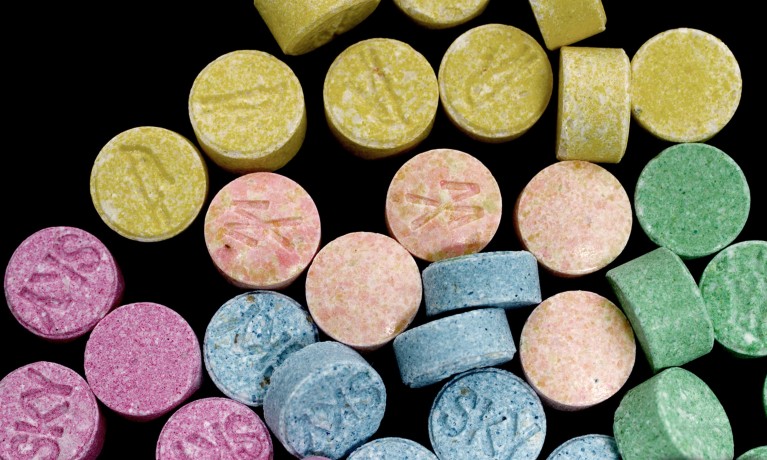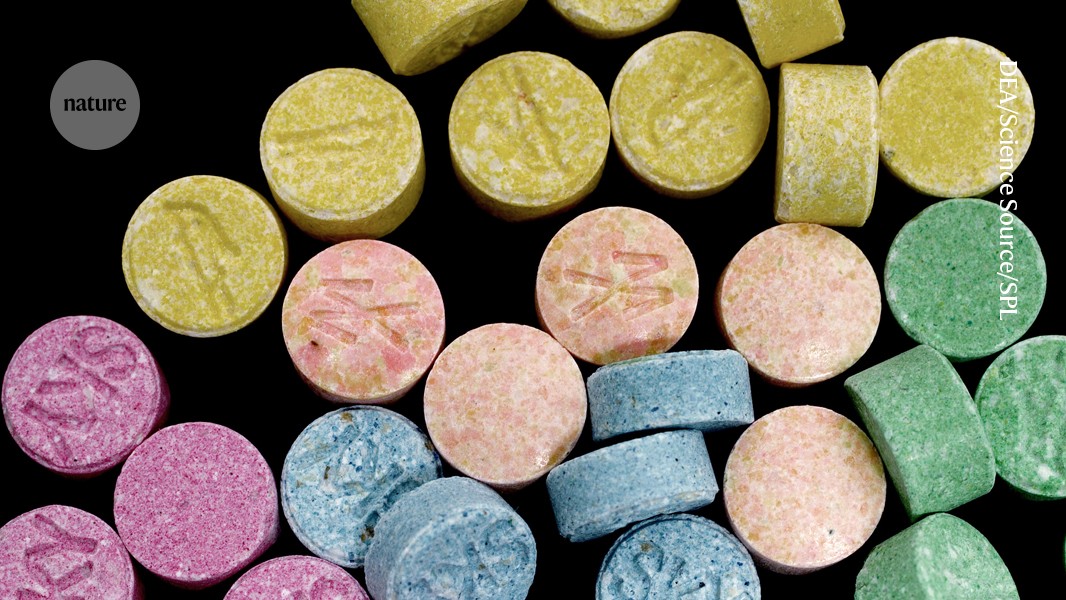
MDMA has been tested as a treatment for post-traumatic stress disorder but has now garnered a vote of no confidence from FDA advisors. Credit: DEA/Science Source/Science Photo Library
In a decision that shocked some observers, key advisors to the US Food and Drug Administration voted that the effectiveness of the party drug MDMA for treating post-traumatic stress disorder is unproven.
Members of an independent scientific advisory committee voted 9 to 2 that human trials of MDMA did not prove its efficacy. They also voted 10 to 1 that the risks of MDMA, also known as ecstasy, outweigh its benefits. The FDA does not have to follow its advisory committee’s recommendations when deciding whether to approve a drug, but often does.
The vote highlighted the difficulty of assessing psychedelic drugs and the FDA’s limited ability to evaluate psychiatric treatments. “It felt strange to vote no,” said committee member and statistician Satish Iyengar at the University of Pittsburgh in Pennsylvania, given that the drug’s effects seemed so strong. “There were just too many problems with it.”
The meeting was held 4 June in Silver Spring, Maryland.
Long campaign
MDMA is a synthetic compound that can evoke euphoria and raise energy levels. It has already been approved for limited use in Australia to treat post-traumatic stress disorder (PTSD) and depression.
For decades, the nonprofit group Multidisciplinary Association for Psychedelic Studies (MAPS) in San Jose, California, has been running MDMA clinical trials and campaigning for drug legalization worldwide. The association’s commercial arm, Lykos Therapeutics in San Jose, has developed an MDMA treatment protocol involving a series of psychotherapy sessions, along with three sessions in which a team of two therapists administers MDMA. The idea, the company has said, is that MDMA is not a treatment in itself, but rather helps people open up to their therapists about traumatic events that might otherwise be difficult to confront.
In its application to the FDA, Lykos cited two clinical trials1,2 in which a total of around 200 people with PTSD received either MDMA or a placebo. More than 80% of those who received MDMA saw significant improvements in their symptoms. And the effect seemed to persist when investigators followed up with a portion of these participants between 6-24 months later.
Lingering concerns
But FDA scientists themselves had a number of concerns about Lykos’s studies, which they felt were lacking crucial psychological and physiological safety data. A major concern was the fact that participants — and their therapists — could almost always tell whether they had received MDMA or a placebo. An FDA report released ahead of the meeting called the data “challenging to interpret.”

How ecstasy and psilocybin are shaking up psychiatry
“The fact is you just can’t blind these studies,” FDA psychiatry division director Tiffany Farchione said at the meeting. In 2016, MAPS and the FDA agreed on a protocol in which an independent assessor who had not taken part in the trial would evaluate each person’s psychiatric progress. But both FDA staff and the advisory committee remained worried that people’s expectations of receiving a drug would affect their response to it.
Other concerns included the fact that around 40% of the trial participants had taken illicit MDMA before the trial, potentially biasing the sample. And many sought other treatments — including psychedelic drugs — between the initial trial and the follow-up, suggesting that their symptoms might have continued and that their improvement might not have been due entirely to MDMA.
Many of the advisory committee members’ questions centered on the role of psychotherapy. Lykos has developed a therapy protocol that would be administered along with the drug. But the FDA does not regulate therapy. The most it can do is ensure that medical practitioners overseeing the drug’s administration provide some therapy.
Therapeutic wild card
Lykos’s protocol gives therapists substantial discretion in how they treat their clients, which left some committee members concerned that trial participants might have received different therapy experiences depending on whether they received a drug or placebo. They pointed out that a good therapist could make a useless drug seem effective, and there is no way to disentangle the two effects. Panel members also worried about how therapists would be trained, and called for strong regulations to protect people from abuse by clinicians when under the influence of the drug.

Potent psychedelic drug banishes PTSD, small study finds
Farchione said she hoped the advisory committee would help the agency to address these issues, particularly given that many other companies are studying psychedelic therapies that the FDA will eventually need to evaluate. “I think we are charting new territory, and we want to set it up right,” she said.
Further raising concerns, a report from the Institute for Clinical and Economic Review, a nonprofit group in Boston, Massachusetts, that analyses medical procedures, reported allegations that people who’d had bad experiences in the initial trials had been discouraged from participating in the follow up study. Lykos denied this at the committee meeting, and the FDA is conducting an investigation that will conclude before it makes a decision on the drug.
“I was absolutely shocked” by the committee’s vote, says psychiatrist Rachel Yehuda at the Icahn School of Medicine at Mount Sinai in New York City, who was not on the committee. “It was very disappointing.” She says the experts brought up good points over the eight-hour hearing, particularly about safety of people receiving treatment. She hopes that the FDA will look for ways to address these concerns instead of simply denying the drug. “I want us to have learned from the committee’s wisdom.” The FDA is expected to issue a decision in August.
In a statement Lykos said, “While we are disappointed in the vote, we are committed to continuing to collaborate with the FDA with their ongoing review of our [new drug application] over the coming weeks.”
